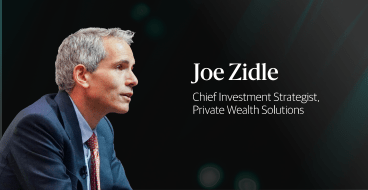Q&A: John Stecher and Jen Morgan on How Technology is Reshaping Business
Chief Technology Officer John Stecher spoke with Global Head of Portfolio Operations Jennifer Morgan about how Blackstone Technology and Innovations (BXTI) helps the firm and its portfolio companies work more efficiently, scale their businesses, and stay at the forefront of technological innovation in their fields.
John Stecher is the Chief Technology Officer of Blackstone. He is responsible for all aspects of technology across Blackstone, advises the firm’s investment teams and acts as a resource to portfolio companies on technology-related matters.
Jennifer Morgan is the Global Head of Portfolio Operations at Blackstone. She and her team are responsible for helping the firm’s portfolio companies drive growth and digital transformation – coupled with identifying and recruiting best-in-class leadership and talent across the portfolio. She is also a key operating partner with a particular focus on the technology companies in which Blackstone invests.
Q: How has technology’s role in Blackstone’s business evolved in recent years?
John Stecher: At nearly every company, technology teams were seen as a back office function and played a reactive role in moving an organization forward. People would mainly reach out to these teams to solve a specific problem or fill an existing need. Now, with technology disrupting nearly every aspect of how business is conducted, technology teams are playing a critical role in integrating new tools across an organization.
Blackstone has evolved into a much more collaborative organization where technology is integrated throughout our various businesses to move the firm forward. Today, technology really underpins all of Blackstone’s business, from managing our investment processes, providing trading and risk management platforms to our Credit and Hedge Fund Solutions groups, and streamlining the firm’s quarterly reporting. We’re aiming to build world-class technology that can empower our people to work more efficiently and collaboratively than they could before, and ultimately make us better investors for our clients.
Jen Morgan: Technology can also accelerate cost and operational improvement opportunities in remarkable ways. For example, our Portfolio Operations team uses a digital platform to procure on behalf of our portfolio, and that scale and data can immediately drive improvements in our companies’ earnings.
Q: The COVID-19 pandemic has revolutionized how technology is used in nearly every industry. How are you thinking about that shift in the context of Blackstone’s portfolio?
JM: Our job is to invest in amazing companies and support them to reach their potential. A huge part of that is the way we help them engage with their employees. Technology has transformed how businesses do that, particularly during the pandemic. Companies have to ask how they can build culture in a virtual environment, or adjust to a new paradigm of hybrid work, and we want to help them use technology in new ways to accomplish that.
JS: I also think that this accelerated adoption of technology will spur new markets and boost existing ones. E-commerce is a great example. It’s not just Amazon doing direct-to-door delivery anymore. There are many companies who have tapped into the store to door market for bespoke goods. There are a whole batch of new business segments that have blown up because of the increased demand.
Q: What is Blackstone doing to ensure the firm and its portfolio companies remain ahead of the curve technologically?
JS: In addition to developing technology in-house and engaging with our portfolio companies to shape their technology strategy, BXTI also leads investments on behalf of the firm in companies that fill a gap in our technology stack, or those of our portfolio companies. This has helped us build a lot of great partnerships with early-stage businesses and founders. The benefit of going to someone in the seed or Series A stage of building a business is that they can more easily adopt their solutions to fit your business needs. The firm can then invest capital into those companies and work with their founders to grow the business.
There are many examples of those types of partnerships, particularly in the data and cybersecurity space. One company we’ve invested in recently is ShiftLeft, which helps developers and security professionals work collaboratively to identify and fix vulnerabilities and release secure code at scale. As all businesses accelerate their digital strategy in the wake of COVID, developing code that is airtight from the outset – instead of having to patch up issues later – is key to scaling efficiently without compromising security.
Q: What’s unique about working in technology at Blackstone?
JS: A big differentiator in working at Blackstone is that beyond building the tools that power the investment processes, you also get to partner with the deal teams to evaluate prospective investments. Having real practitioners and users of technology opine on the efficacy or uniqueness of a company’s technology – I think that sets us apart from other top financial services firms.
Many technologists are interested not just in writing code and deploying solutions, but also in understanding the businesses that they work in. There are also a lot of people interested in early-stage technology investing. At Blackstone, your day job is building cutting-edge technology that makes some of the best investors in the world even better.
JM: Another thing that’s differentiating about Blackstone is our vantage point. We have a portfolio of over two hundred companies and more than 8000 properties globally. It’s essentially a micro economy that reflects the major trends happening in the world. Having that scale allows us to sometimes see around corners and connect new value chains that maybe aren’t as obvious to others. That ability to anticipate what the next big thing will be is invaluable for those interested in technology.
Q: Where do you see technology at Blackstone going in the next five years? And what excites you about the future of tech at Blackstone?
JM: Our company is growing at a remarkable rate, and in order to scale, you have to have three things. The first is amazing talent, which we have. The second is process rigor. You need to be able to organize and function at a level of scale and move fast. Of course, it’s important to keep the things that make the team special, but you need processes to make sure that the trains are running the way that they’re supposed to.
In order to do that, you need the third ingredient, which is great technology. As investors and portfolio managers, we’re always trying to anticipate what will happen next to both optimize our investments and make sure we get ahead of any challenges. Technology is critical to that.
Those three things together will create amazing learnings that we can use to better ourselves. I’m excited to continue working with John to identify those insights and use them to help the company adapt as it continues to grow.
JS: My biggest expectation over the next five years is that BXTI will play an even more integrated role across our businesses to deliver technology that sets us apart from our competition and become more deeply involved in thought leadership and conducting diligence on companies during the investment process. I also look forward to continuing to grow our team with diverse, top talent across our New York and Miami offices.




